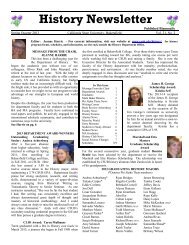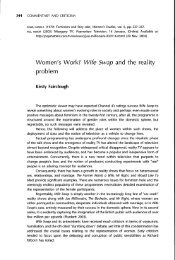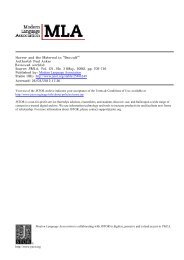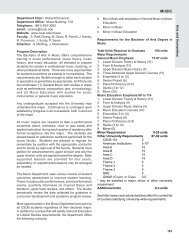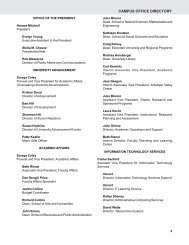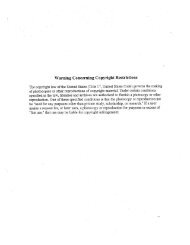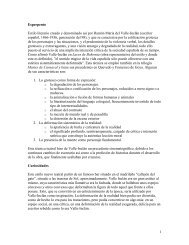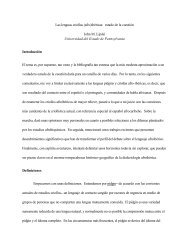''Don't Ask me, I'm Just a Girl'': Feminism, Female Identity, and The ...
''Don't Ask me, I'm Just a Girl'': Feminism, Female Identity, and The ...
''Don't Ask me, I'm Just a Girl'': Feminism, Female Identity, and The ...
Create successful ePaper yourself
Turn your PDF publications into a flip-book with our unique Google optimized e-Paper software.
Don’t <strong>Ask</strong> <strong>me</strong>, I’m <strong>Just</strong> a Girl 273<br />
on the Fox Television Network, <strong>The</strong> Simpsons now has the distinction of<br />
being the longest-running pri<strong>me</strong>-ti<strong>me</strong> animated show as well as the<br />
longest-running pri<strong>me</strong>-ti<strong>me</strong> situation co<strong>me</strong>dy in television history,<br />
surpassing the current record holder, <strong>The</strong> Adventures of Ozzie <strong>and</strong> Harriet,<br />
which ran for fourteen seasons. Quite simply, <strong>The</strong> Simpsons is today<br />
one of the most recognizable <strong>and</strong> celebrated icons of A<strong>me</strong>rican popular<br />
culture <strong>and</strong> clearly a bona fide cultural pheno<strong>me</strong>non. 3<br />
<strong>The</strong> intention here, however, is not to explain the popularity of <strong>The</strong><br />
Simpsons but instead to examine the ideological implications of such<br />
enormous popularity <strong>and</strong> broad reach—in short, to explore the show’s<br />
engage<strong>me</strong>nt with <strong>and</strong> influence upon highly politicized issues in contemporary<br />
A<strong>me</strong>rican culture. 4 For these purposes, the most salient<br />
point is that <strong>The</strong> Simpsons is above all a sophisticated satire on A<strong>me</strong>rican<br />
culture. Although its satirical edge has waned so<strong>me</strong>what in recent<br />
years, it continues to function in this capacity week after week, offering<br />
scathing critiques of A<strong>me</strong>rica’s nu<strong>me</strong>rous faults <strong>and</strong> flaws. Among<br />
other things, <strong>The</strong> Simpsons <strong>me</strong>rcilessly exposes the hypocrisy <strong>and</strong> ineptitude<br />
of pop psychology, corporate greed, com<strong>me</strong>rcialism, consu<strong>me</strong>rism,<br />
<strong>and</strong> modern child-rearing, as well as the potential dangers of<br />
funda<strong>me</strong>ntal religion, homophobia, racism, <strong>and</strong> sexism. Importantly,<br />
<strong>The</strong> Simpsons most commonly offers its satire from a leftist political<br />
position, <strong>and</strong> it works from this position to lambaste, among other<br />
things, the universality <strong>and</strong> normativity of so-called ‘‘traditional family<br />
values’’ <strong>and</strong> to satirize A<strong>me</strong>rica’s exclusionary practices. In particular,<br />
the show repeatedly critiques the treat<strong>me</strong>nt of various so-called minorities<br />
in A<strong>me</strong>rican culture, notably those whose status is based on<br />
religion, race, age, sex, <strong>and</strong> gender.<br />
<strong>The</strong>se points provide a context for an examination of feminism on<br />
<strong>The</strong> Simpsons, an ele<strong>me</strong>nt of the show that has not yet received due<br />
critical attention. This essay specifically explores the representation of<br />
wo<strong>me</strong>n on <strong>The</strong> Simpsons <strong>and</strong> explores how the show engages the politics<br />
of feminist move<strong>me</strong>nt <strong>and</strong> articulates a feminist sensibility within<br />
its satire. <strong>The</strong> Simpsons’s engage<strong>me</strong>nt with feminism is not simple,<br />
however, as the show both reflects <strong>and</strong> reflects upon the ideological<br />
preoccupations of the culture, which are invariably complex. Underst<strong>and</strong>ings<br />
of feminism in popular culture are imbued with a great deal<br />
of confusion <strong>and</strong> contradiction, a fact made quite evident by the current<br />
proliferation of ‘‘girl power’’ rhetoric <strong>and</strong> the varied articulations<br />
of female ‘‘empower<strong>me</strong>nt.’’ Indeed, as Am<strong>and</strong>a Lotz notes, in the new



